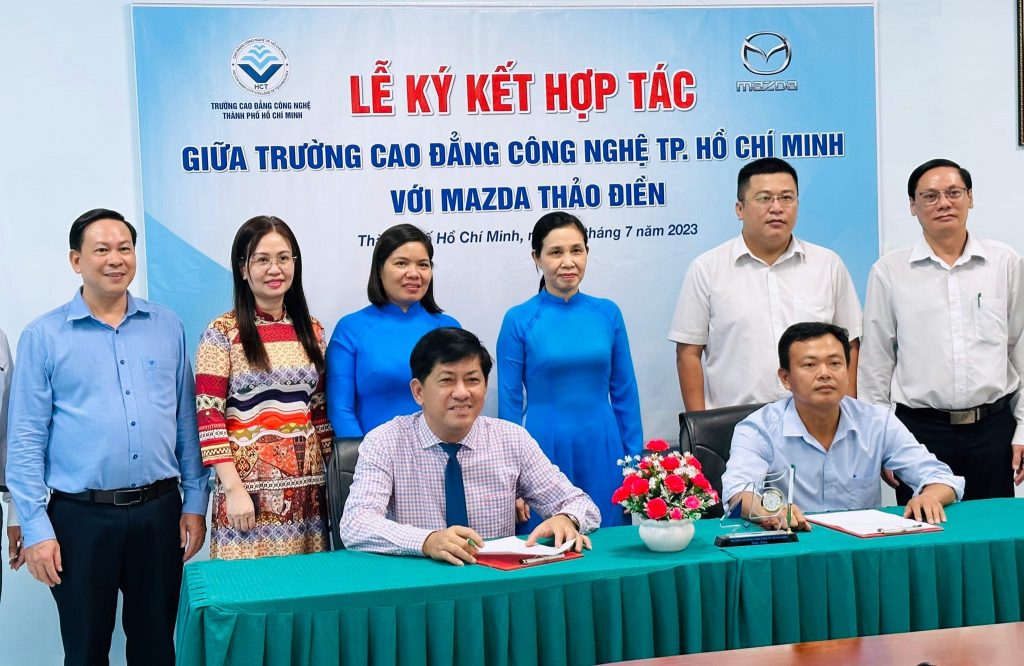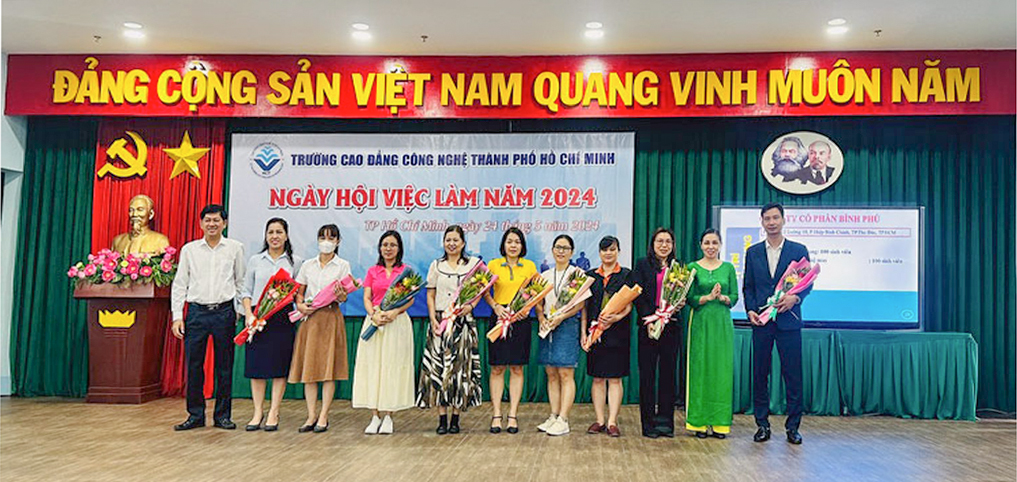The Needs of Businesses and the Labor Market as the Goal of Vocational Training
With 19 college-level Programs and 10 Vocational intermediate-level Training Programs, Ho Chi Minh City College Technology (HCT) is Adapting to the Diverse Needs of the Labor Market. For 2024-2025, the College plans to enroll over 1,800 students, forecasting that this will produce a highly skilled workforce after undergoing training with a renovated program aligned with business and market needs.
Strengthening School-Business Connections
Given the economic fluctuations, the labor market is experiencing shifts in workforce demand, particularly as companies, including those in the textile garment sector, must meet stringent customer requirements. The transition from traditional workers, who primarily needed to be diligent and skilled in their trade, to high-quality, adaptable workers proficient with new equipment and technologies, is crucial for businesses to enhance their competitiveness.
Dr. Nguyen Ngoc Hien-HCT’s Headmaster notes that one major challenge that businesses face is the shortage of skilled labor capable of meeting the development needs of international and regional economic integration. The role of training institutions in providing a qualified workforce for businesses is essential and urgent. Therefore, improving training quality is a key focus, carried out regularly to enhance the reputation of training institutions and to strengthen the connection between schools and businesses -a necessary trend for sustainable development and mutual benefit.
In practice, HCT has been actively working to strengthen its training connections with businesses for several years. The college has established partnerships with over 100 companies across various fields, involving activities such as: participating in and advising on training programs that closely reflect business performances; assigning lecturers and experts to teach certain courses; providing equipment and tools for practical training; offering scholarships to encourage students; facilitating internships and job placements for graduates; and allowing faculty to gain practical experience. Businesses assist by providing management and technical staff to train and guide students in “Business Practice” and “Internship” courses, which last 16-18 weeks, reflecting the roles students will assume after graduation. Many students have already secured job commitments from businesses before completing their studies.
The practice at businesses has helped to improve teaching quality. Dr. Hien explains that the college’s policy is to send lecturers for 6 months to a year to work at enterprises in positions outlined in the training program, aiming for faculty to be competent in the jobs students will eventually take on. Only by mastering these roles can faculty effectively mentor students.
According to college statistics, over 90% of graduates have stable employment. Notably, nearly 100% of textile garment students are employed, with many being hired directly during their internships.
Training a Workforce Adapted to Market Needs
Master Nguyen Ngoc Hien observes that despite a prevailing preference for university over vocational education, vocational schools face significant recruitment challenges as universities aggressively pursue higher education enrollments. HCT, with a focus on textile-related fields, faces additional difficulties as textile garment industry businesses also encounter challenges. In response, the college has implemented several breakthrough strategies, utilizing government policies to create favorable conditions for attracting students and meeting social and business needs. As a result, the college recruited 1,400 students in 2023 and 1,800 in 2024, exceeding targets and showing an increase compared to previous years. Innovative approaches to recruitment and improvements in institutional activities have proven effective, enhancing the HCT’s brand and competitiveness. These include shortening training programs to 2.5 years, diversifying training fields, updating the 9+ curriculum, achieving quality accreditation, financial autonomy, autonomy in national defense education, and establishing a Dong Nai campus.

The college views educational programs as a critical factor in training quality. Annually, the college reviews and updates goals, content, and programs to ensure quality for labor market demands. The focus is on practical skills, with job-specific roles being developed to guide students in selecting positions suitable to their capabilities and interests. This approach helps students clearly define their goals, self-learn, and refine skills for their chosen roles, ensuring they are job-ready upon graduation.
The college also focuses on adjusting the curriculum and training methods. Theoretical and foundational courses are concentrated according to the field of study, while specialized courses, practical training, and internships are divided into specialized tracks aligned with job positions, allowing students to choose accordingly. Practical training and internships are conducted at businesses, with management and technical staff from the companies directly guiding the students. The adjustment of the curriculum towards practical, hands-on training, which accounts for 70% of the program’s content, has enabled students not only to acquire fundamental and specialized knowledge but also to master practical skills and perform proficiently in the specialized tasks for which they are trained.

To meet the textile garment industry’s recruitment needs, the college has expanded specialized courses tied to specific job roles in businesses, such as Lean Manufacturing Management, Quality Control in Textiles, and Automation in Textiles. Additionally, courses on 4.0 technology and green energy have been added, ensuring each program includes at least one relevant subject.
Dedicated Faculty and Enthusiastic Students
Master Hien emphasizes the college’s commitment to “Dedicated – Devoted – Honest – Responsible” values for its staff and faculty, aiming for instructors to be sources of inspiration and career guidance for students. Passion and dedication in teaching create a stimulating learning environment, motivating students to pursue their chosen careers.
Recognizing the need for skilled workers adept with new technologies, HCT has invested in modern facilities, including over 300 computers, and practice labs for automotive, electronics, mechanics, culinary arts, and fashion technology, ensuring students have access to cutting-edge technology and practical skills.

Student Le Huynh Duc from Class CĐ21CM01 in Sewing Technology shares that the training program and courses align well with industry practices, providing relevant, modern education. Internships allow students to apply classroom knowledge in real-world settings. We hope the university continues to update its curriculum with new technology trends to ensure it can meet market demands.
Similarly, Tran Long Khanh, a student from Class CĐ21TĐ01 majoring in Graphic Design, shared that during schooling time, he found the school’s facilities well-equipped, allowing students to practice and train on modern equipment. Regarding the curriculum, the college and lecturers place great emphasis on teaching students both professional and soft skills. We were given more practical lessons, and the teachers guided us to learn and research independently to develop our thinking and abilities. With the advancement of modern production technologies, we hope that the school will regularly upgrade practical learning software on computers, enabling us to quickly adapt to new technologies and meet the job market demands after graduation.
Looking ahead to the 2024-2025 academic year, Mr. Nguyen Ngoc Hien stated that enrollment in textile and garment majors is currently challenging for several reasons, including students shifting to higher-paying and less physically demanding fields. However, HCT believes that these difficulties are only temporary and will soon be overcome, as the demand for jobs in the textile and garment industry remains high, with an increasingly diverse and abundant need for garments. With this understanding, HCT is making efforts to implement various measures to attract students, focusing on improving the quality of education to best meet the requirements of positions aligned with the trends of the 4.0 industrial revolution. The college also emphasizes skill development to help technical and management staff increase their productivity and income, fostering a deeper commitment to their careers. Key training programs, such as Fashion Design, Fashion Business, Fashion Technology, and Textile Technology, remain central to the school’s vision for supporting the textile and garment industry’s needs, both now and in the future.
